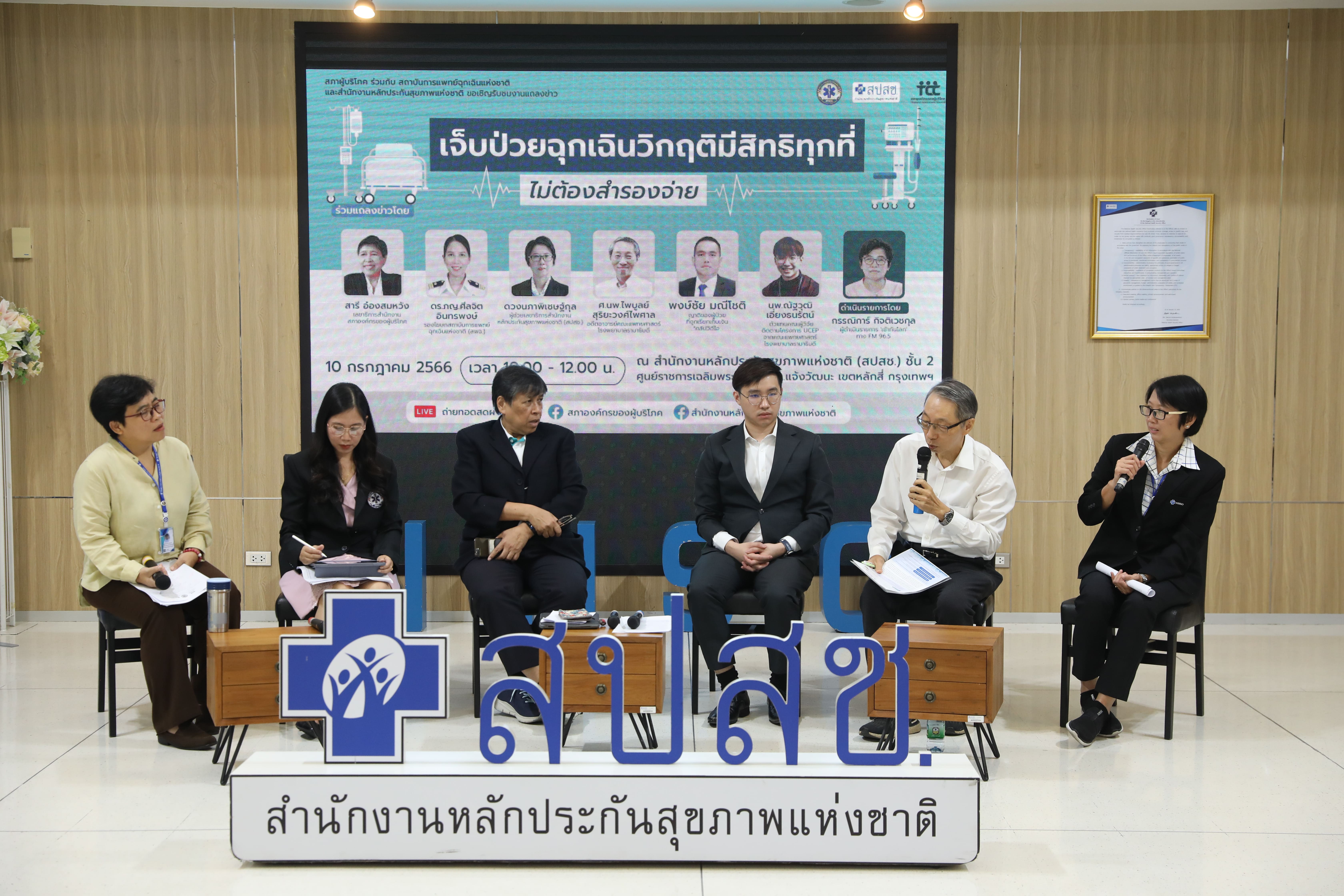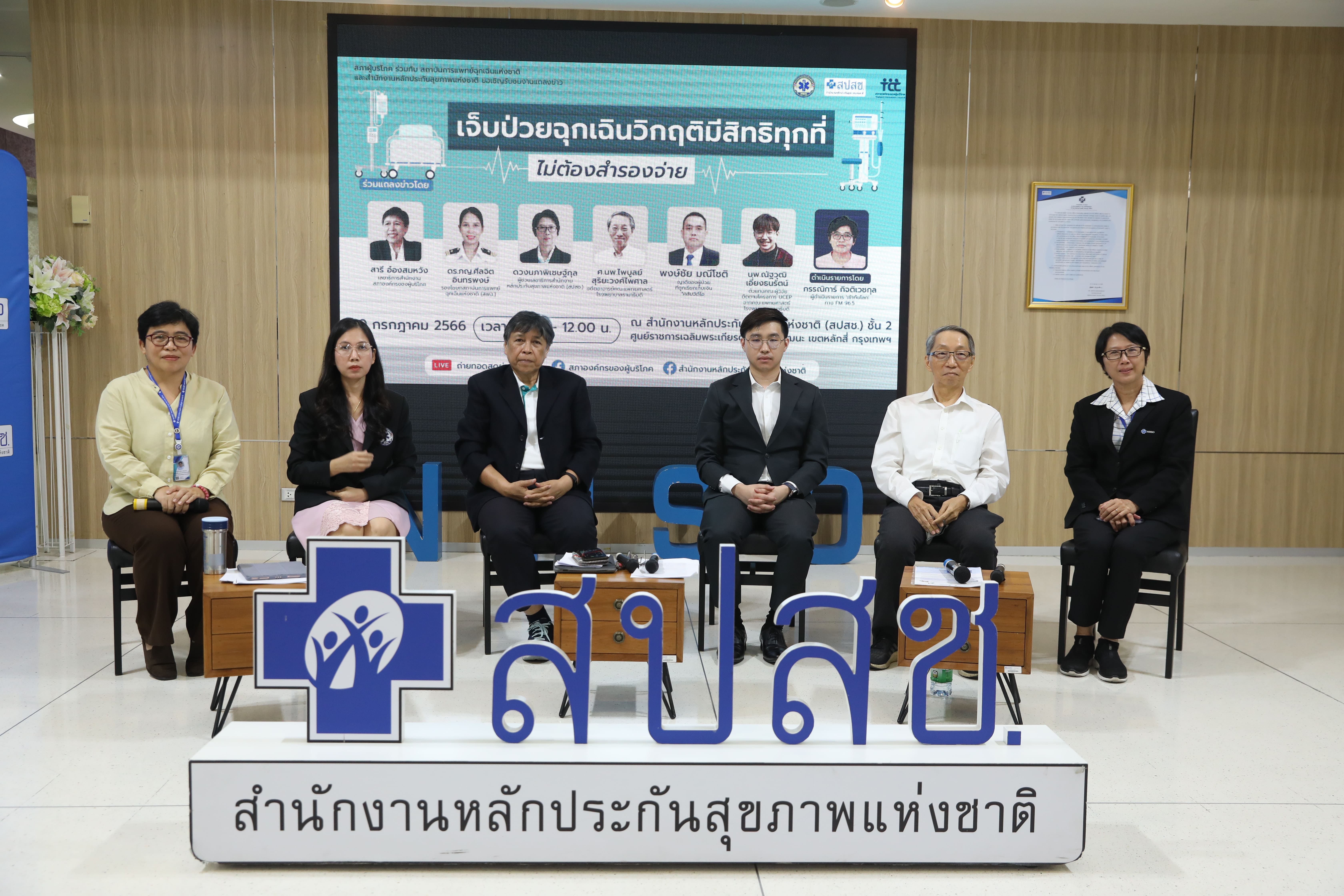
- Home
- DescriptionNews
Disparity needed to be addressed in Thailand’s emergency care

Disparity needed to be addressed in Thailand’s emergency care
Universal Coverage for Emergency Patients (UCEP) is considered successful in increasing patient's access to emergency care. However, some gaps result in extra billing and disparities in service access.
On July 10, groups of patients, doctors, researchers, and civil society representatives joined the seminar to review the progress of UCEP and find solutions to address its challenges and obstacles in providing emergency care.
Saree Ongsomwang, Secretary-General of Thailand Consumers Council (TCL), revealed during the conference that the implementation of UCEP has proven to bring healthcare benefits to the public.
Launched in 2017, UCEP allows emergency patients to receive prompt treatment at the nearest hospital within the first 72 hours. The program has reduced the financial burdens of the patients who require quick access to emergency care to save lives.
However, Saree said that there are still some issues needed to be addressed. There have been cases of patients being charged for treatment despite their eligibility to receive free services covered by UCEP.
TCL data from July 2021 to March 2023 shows that the complaints relating to UCEP are among the top three most complaints delivered to the consumer organization.
There are 232 cases of UCEP out of 1,979 complaints in total, accounting for 11.72%.
The complaints include incurred expenses while receiving emergency care (56 cases), charged for emergency service utilization (53 cases), denied service (42 cases), inconvenience during treatment (39 cases), failure to comply with public health service standards (35 cases), exorbitant medical expenses (4 cases), and failure to transfer patients (3 cases).
TCL has coordinated with relevant agencies to address these issues and provided suggestions to relevant government agencies to improve the services, including the National Institute for Emergency Medicine (NIEM) under the Ministry of Public Health, which regulates the healthcare services at hospitals.
Department of Internal Trade of Thailand under the Ministry of Commerce is urged to monitor treatment fees.
Adress the challanges
To solve the challenges, Dr Silachit Intharapong, NIEM Deputy Spokesperson, said that her organization had established the "Emergency Patient Rights Protection Coordination Center" to assist patients in getting care and coordinate with health providers to deliver that care.
The center deploys the Emergency Pre-authorization (PA) program to categorize patients based on their symptoms. Hospital staff will input symptom and vital sign data into the program, which will then assess whether the patients meet the criteria for UCEP.
The criteria include having critical symptoms like unconsciousness, respiratory distress, severe shortness of breath, severe chest pain, half-body paralyzing, and continuous seizures.
Emergency medicine specialists will also be available to provide consultation and conduct additional screening for patients, who will receive treatment until the emergency condition is stabilized within 72 hours without extra billing.
National Health Security Office (NHSO) has acted as a clearing house by reimbursing healthcare fees to the hospitals.
Douangnapa Pichetkul, Assistant Secretary-General, NHSO, reported that the annual number of patients receiving emergency care under UCEP had increased from 3,896 in 2017 to 18,547 in 2021.
The number peaked at 499,876 cases in 2022 due to the COVID-19 emergency cases. There have been a total of 587,960 cases over the course of six years.
Through the NHSO 1330 contact center, there are a total of 7,522 cases since the beginning of the program.

Success, but still gaps
Dr Natthawut Iangtanarat., a researcher monitoring UCEP, stated that the success of the UCEP program could be viewed from three perspectives.
First, it has reduced disparities in accessing emergency medical services for all patients. Second, the criteria for sorting emergency patients, which private hospitals now accept, have become more apparent.
Lastly, the uniform payment method has resulted in equal quality of care, and the mortality rates among different healthcare entitlements do not differ significantly.
However, when looking at the success from the perspective of whether all emergency patients with UCEP can access medical services according to the level of urgency advertised, there is still no conclusive evidence supporting it.
There are still disparities in service quality across regions and gaps in the pre-hospital care process, said Dr Natthawut. Around 20-30% of patients must pay deposits at private hospitals before receiving services.
In addition, healthcare providers still face issues with incomplete pre-authorization data.
The 72-hour time constraint does not align with the needs of some patients, who need more extended periods of care before being discharged or transferred to other hospitals.
Dr Natthawut said that the research suggests expanding the UCEP coverage to all public hospitals nationwide to ensure every emergency patient can access timely, quality, and comprehensive care.
It also suggests flexible financial regulations for private hospitals and the promotion of provincial administrative organizations to develop a network of emergency medical services in collaboration with district health hospitals, provincial health offices, and various foundations to reduce disparities in emergency care between regions.

